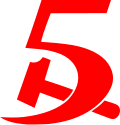Fifth International
| Part of a series on |
| Socialism |
|---|
 |
| Part of a series on |
| Communism |
|---|
 |
|
|
The phrase Fifth International refers to the efforts made by groups of socialists and communists to create a new workers' international.
Previous internationals
[edit]There have been several previous international workers' organisations, and the call for a Fifth International presupposes the recognition of four in particular, each of which regarded itself as the successor to the previous ones:
- The "First International", known as the "International Workingmen's Association", was founded in London in 1864 and dissolved in 1876.
- The "Second International", known as the "Socialist International", was founded in 1889 after the expulsion of anarchists from the First International and existed until its dissolution in 1916. The Second International was a direct ancestor of the modern Socialist International, an international organization of mainstream social democratic political parties.
- The "Third International", known as the "Communist International" and "Comintern", was founded by Vladimir Lenin in 1919 after the failure of the Second International at the start of World War I. The group was dissolved in 1943.
- The "Fourth International" was founded in 1938 by Leon Trotsky in opposition to Stalinism. Trotsky considered the Third International to be irreformable, counter-revolution, and under the control of a bureaucratic elite from the Soviet Union. The Fourth International was dissolved in 1953.
Although a reunified Fourth International still exists, the fragmentation of Trotskyism has resulted in the call for a fifth international.
Calls for a Fifth International
[edit]In November 1938, two months after the founding congress of the Fourth International, seven members of the Spanish Workers' Party of Marxist Unification on trial in Barcelona declared their support for a "fighting Fifth International".[1] The Argentine Trotskyist Liborio Justo called for a Fifth International when he broke from Trotskyism in 1941.[2] Another call for a Fifth International was made by Lyndon LaRouche after leaving the Spartacist League in 1965.[3] Later, a "Fifth International of Communists" was founded in 1994 by several small former Trotskyist groups around the Movement for a Socialist Future.
League for the Fifth International
[edit]
In 2003, the League for a Revolutionary Communist International called for the formation of the Fifth International "as soon as possible – not in the distant future but in the months and years ahead".[4] The group became the League for the Fifth International (L5I), which as of 2010 has sections in Austria, the Czech Republic, Germany, Pakistan, Sri Lanka (the Socialist Party of Sri Lanka), Sweden, the United Kingdom and the United States.[citation needed] It is "an organization of communists and Trotskyists".[4] The League for the Fifth International campaigns in the European Social Forum and the international labour movement for the formation of a new International. Splinter group the Communist Workers' Group in New Zealand also argues for a Fifth International.
Hugo Chávez
[edit]Hugo Chávez announced in 2007 that he would seek to create a new international: "2008 could be a good time to convoke a meeting of left parties in Latin America to organise a new international, an organisation of parties and movements of the left in Latin America and the Caribbean".[5][6]
The League for the Fifth International critically supported the proposal.[7]
In popular culture
[edit]Poet Allen Ginsberg mentions a Fifth International in "Footnote to Howl", the final part of his poem "Howl".[8]
The card game Illuminati by Steve Jackson Games features the Fifth International as a "communist" and "conservative" group.[9][10]
In the novel The Moon Is a Harsh Mistress by Robert Heinlein while discussing the different political ideologies of Professor de la Paz, Wyoming Knott, and Manuel O'Kelly-Davis as they attempted to design a revolution that would work to free Luna from Luna Authority control. The character Wyoming Knott identified herself as a Fifth Internationalist but stated she was "no Marxist".
See also
[edit]- International Communist Seminar
- International Meeting of Communist and Workers' Parties
- List of left-wing internationals
- São Paulo Forum
References
[edit]- ^ "Foreign News: Trotskyists Liquidated". Time. 7 November 1938. Archived from the original on 1 October 2007.
During the trial Poum defendants stressed that, while they 'admired Trotsky,' they regarded his Fourth International as too academic and favored a fighting Fifth International.
- ^ "Argentine Trotskyism, Part III - RH". Revolutionary History. 2 (2). Summer 1989. Retrieved 2 March 2016.
- ^ Wohlforth, Tim. "A '60's Socialist Takes a Hard Right". PublicEye.org. Archived from the original on 25 January 2021. Retrieved 2 March 2016.
- ^ a b "Arbetarmakt - LFI: Forward to the Fifth International". Archived from the original on 17 January 2013. Retrieved 28 July 2024.
- ^ Fuentes, Federico (2 September 2007). "Venezuela's Revolution". Green Left Weekly. Archived from the original on 10 November 2007. Retrieved 11 October 2017.
- ^ "Chávez Proposes International of Left Parties". Translated by Furuhashi, Yoshie. 27 August 2007. Archived from the original on 23 March 2021. Retrieved 2 March 2016.
- ^ "Venezuela's President Hugo Chávez calls for Fifth International". League for the Fifth International. 25 November 2009. Archived from the original on 26 January 2021. Retrieved 2 March 2016.
- ^ "Footnote to Howl by Allen Ginsberg". Poetry Foundation. 11 October 2017. Archived from the original on 23 March 2021. Retrieved 11 October 2017.
- ^ "Steve Jackson Games Forum Discussion of Illuminati Expansion Set Cards". Steve Jackson Games. 17 August 2009. Archived from the original on 7 August 2020. Retrieved 21 October 2017.
- ^ "Steve Jackson Games Forum Discussion of Illuminati Deluxe Set Cards". Steve Jackson Games. 22 October 2005. Archived from the original on 3 January 2022. Retrieved 21 October 2017.
